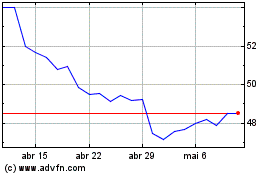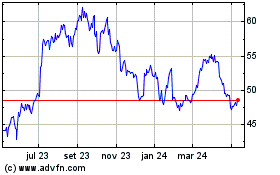Companies Curb Their Political Spending
02 Outubro 2018 - 6:59AM
Dow Jones News
By Theo Francis
The biggest publicly traded companies are increasingly limiting
their spending on elections and other political activity, a new
report has found.
The report is the fourth annual analysis of political-spending
policies at S&P 500 companies from the Center for Political
Accountability, a nonprofit organization in Washington, D.C., that
advocates better disclosure of corporate political activity.
Among the 414 companies that have remained in the S&P 500
since 2015, increasing numbers are either prohibiting or fully
disclosing direct contributions to candidates, and contributions
for election-related use to trade associations, so-called 527
groups and other nonprofits.
About 36% of the S&P 500, or 176 companies, have said they
won't engage in at least one form of spending on political
activity, up from 32% a year ago and a quarter in 2015, the report
found.
Some 132 said they forego so-called independent expenditures,
such as when companies fund ads or events supporting or opposing a
candidate or party. That is up 10% over last year, and almost 60%
from 2015. (Such spending can't be coordinated with candidates or
parties.)
Contributions to state candidates and party committees are
prohibited at 107 companies, while 80 bar contributions to
so-called 527 political organizations. Just 35 companies prohibit
contributions to trade associations for influencing elections.
Ten companies in the index reported engaging in no corporate
political spending, including Goldman Sachs Group Inc.,
International Business Machines Corp. and Schlumberger Ltd.
A Schlumberger spokesman declined to comment late Monday. A
spokesman for IBM declined to comment beyond confirming the
company's policy. A Goldman Sachs spokesman declined to comment. A
January 2018 statement on Goldman's political and policy activity
notes that it asks trade associations not to use its contributions
to influence elections.
More companies are also requiring senior managers or a committee
of the company's board to review or approve various kinds of
political spending, the report found.
Some of the group's benchmarks for disclosure of political
spending have slipped, however. The number of all S&P 500
companies with a webpage dedicated to political spending fell to
259, from 268 a year earlier.
Much of that reflects turnover among companies joining the
index, said Bruce Freed, the center's president. Among the 414
companies in the index since 2015, disclosure has also increased
steadily.
In general, the analysis found, larger companies and companies
in the index longer were more likely to score higher on disclosure
measures. Utility, energy, health-care and consumer-staples
companies also tended to score higher, while technology, industrial
and consumer-discretionary companies trailed. Real-estate companies
scored worst, on average.
The report doesn't consider lobbying expenditures, or spending
by corporate political-action committees, or PACs, which are funded
by employee contributions.
The center is funded by foundations and individuals and doesn't
receive contributions from companies or unions, Mr. Freed said. It
works with investors that can propose proxy measures directing
companies to disclose or limit spending. In many cases, the
companies agree to improve disclosure if the proxy proposal is
dropped.
This year, the center took six companies to task for no longer
complying with such agreements made in the past, and called out 14
companies for "backsliding," or scoring substantially worse on its
measures this year than previously.
The group said CSX Corp. failed to post a report on 2017
political spending, despite a 2012 agreement with the New York
State Common Retirement Fund to make disclosures.
A CSX spokeswoman said the company inadvertently failed to post
its full report, and it did so on Monday morning. "CSX is fully
committed to the disclosure of all political spending," the
spokeswoman said in an email.
The group said Lowe's Cos. had omitted from a corporate report a
previous statement that it doesn't contribute to candidates or
political campaigns, or to various nonprofit groups for political
purposes. In 2013, the company entered into an agreement with the
New York City Employees' Retirement System to disclose political
spending.
A Lowe's spokesman said the company still doesn't contribute to
political campaigns or candidates, or to nonprofit groups for
political purposes, and that it published a streamlined version of
its report for 2017.
Write to Theo Francis at theo.francis@wsj.com
(END) Dow Jones Newswires
October 02, 2018 05:44 ET (09:44 GMT)
Copyright (c) 2018 Dow Jones & Company, Inc.
Schlumberger (NYSE:SLB)
Gráfico Histórico do Ativo
De Jun 2024 até Jul 2024

Schlumberger (NYSE:SLB)
Gráfico Histórico do Ativo
De Jul 2023 até Jul 2024
